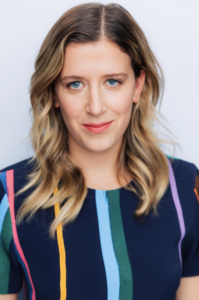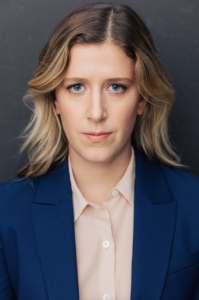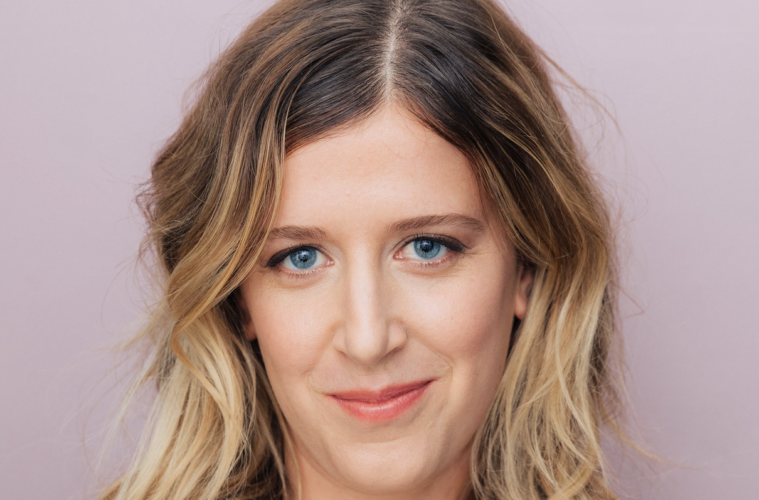Today, HOLR is sitting down with actress, writer, director, and producer, Genevieve Adams!
Genevieve Adams is sitting down to chat with HOLR about Simchas and Sorrows, and how personal experiences have helped inspire the sensitive, dramatic, and comedic storyline. In addition, the talented actress, writer, director, and producer is opening up about the true struggles of being a female filmmaker.
Keep reading to learn all about Genevieve and her inspiring career to date.
Tell us about how you got your start in the industry as an actress, writer, director, and producer.
I come from a long line of artists– my grandparents wrote and acted in a musical sketch comedy show together in Chicago in the 1950s that moved to off-broadway titled, “Quick Changes.” I think my love of performance runs in the blood. Growing up in NYC, I had the opportunity to be a part of a musical theater troupe as a child, and from there got cast in Lincoln Center’s Hansel Und Gretel, an opera, with sets by Maurice Sendak. I remember getting my first check as a performer in the third grade and thinking this is incredible – that you can get paid to do something so fun! The whole experience was thrilling for me– getting to leave school early to go to rehearsals at Lincoln Center and being on that huge stage under a set piece at the opening of the show, from there I was completely hooked. I got into film after college when a casting director saw me in a play I wrote and produced and cast me in Pascale Ferran’s Film “Bird People”. She’s a truly gifted artist, and the film ended up in Cannes where we all reunited on the red carpet – which was surreal.

How did you pull from your own experience when crafting a storyline for the film “Simchas and Sorrows?”
The inspiration for the film began when my now husband Ben proposed to me – and suddenly his Jewish identity became a major part of the wedding planning conversation. So, I was startled at first, and a bit unsettled about the thought of dipping my toe back into anything religious. I realized as we went through the wedding planning process, how many other people relate to this – I heard stories from friends about couples almost breaking up over whether it’s a kosher or non-kosher menu etc. I started to realize what a sensitive, dramatic, and comedic subject this is, especially in the Jewish tradition since the religion emphasizes keeping the tribe alive (which means having Jewish children which means the mother must be Jewish). All of this is to say my husband signed us up for a class at a synagogue for couples embarking on similar journeys. There were lots of characters around that table and at the beginning, there was a lot of comic, awkward moments as this unlikely group all got to know one another. In the beginning, I just thought this would be another one of my comedic sketches, and I started jotting down funny lines and describing the characters in the class. As we got to know each other better, the more profound, confounding questions surfaced, and I quickly realized I was writing more than just a comedic sketch – there was a full screenplay here.
Tell us more about “Simchas and Sorrows” and how it’s a labor of love.
Anytime you create something like this from nothing, it’s a labor of love because it’s nearly impossible to get independent films made! So, you have to be really persistent. This film in particular is based on a period in my life that was very significant, so I felt particularly vulnerable. This is why I emphasized that we cast the right actors in the other roles which we did, many of whom are very good friends of mine. We assembled a truly generous, hilarious, kind, smart, professional, and multi-talented group. I felt understood and seen by the cast and crew, so I was able, to be honest and challenge myself. The story isn’t just about my character’s journey, either, and I felt compelled to tell it because of what’s going on in the world right now. All of us involved in this project felt a particular urgency to tell this story right, and to tell it right now, as we struggle to metabolize the myriad threats that modern Judaism faces during this volatile, divisive, and distressing period in American history. The disturbing resurfacing of hate groups, and the troubling rise of anti-Semitism around the world, make a story about coming together and acknowledging our shared humanity timely and necessary. Our characters grapple with controversy, including the conflict in Israel and Palestine, the widening gulf that exists between the Ultra-Orthodox and the broader Jewish population, and the intergenerational trauma that persists as a result of the Holocaust.
Can you talk to us about some of the struggles you face as a female filmmaker?
We deal with double standards, and real discrimination when it comes to how and what we present on film a lot more scrutiny, and judgment. We often feel we have to prove ourselves even more by doing outrageous things on camera by being shocking. I’ve never been able to do that. It’s just not my style. Meanwhile, there’s a long tradition in independent movies of intellectual, more subtle, dialogue/idea-driven films with neurotic leading male characters some of my favorites being Mike Mills, Joe Swanberg, Noah Baumbach, Ed Burns, Whit Stillman, and Ira Sachs. I’ve always been a fan of this kind of quiet indie filmmaking, where the lives of the characters are not overly dramatized -their vulnerabilities are put into perspective and don’t define them completely as individuals. You rarely see this kind of subtly comedic, idea-driven, dialogue-driven dramedy when it comes to female writers and directors, one because there are so few of us whose work gets to be made, and two because there’s a very real anxiety among those female writers and directors that I know who actually get to make their work of being seen as delicate or soft or light. Somehow less serious than their male counterparts. Which just isn’t fair. I applaud, look up to, and thank those women who have started to pave the way forward for this, like Maggie Gyllenhaal, Greta Gerwig, Nicole Holofcener, Sofia Coppola, Pascale Ferran, and Rebecca Miller. Thank God for these brave ladies. I believe our characters shouldn’t have to behave super badly or oversexualize themselves in order to get attention. We deserve attention as we are, and we can tell each individual woman’s story truthfully, and people will find it interesting. Of course, there will always and should always be space for the shocking in cinema, but it’s not every woman’s story. I tried to convey some of this female desperation to be taken seriously in the film, while ironically making ourselves more ridiculous, with Agnes’ audition for the crack whore as a woman, that’s the role she’s given. She takes it because she loves acting, and the options for her are limited.

In your new project, you’ll star alongside Josh Brener (Silicon Valley) and Tony Cavalero (The Righteous Gemstones) in the film Cold Wallet. What can you tell us about this movie in terms of what we can expect?
Cold Wallet is a really timely film – a crypto heist thriller. I think you can expect the unexpected from this one. I had so much fun working with Cutter on this he and John Hibey have put together an excellent cast, and it was such an honor to be a part of that team.
What are some of your future career goals?
Covid reminded me how much I love and miss the theater –experiencing art together. I’d really like to get back on stage. I’m writing two theatrical projects right now that I’m very excited about!
Published by HOLR Magazine.


